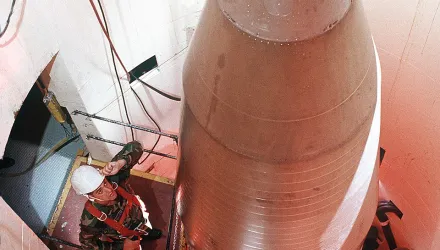The West is threatening another round of sanctions against Russia in an effort to deter meddling in the May 25 presidential elections in Ukraine. The Obama administration and its allies are placing high hopes in the ability of sanctions to sway Russian actions and generally contest Russia’s annexation of Crimea and meddling in the Ukraine. Yet, if lessons gleaned from other sanctions episodes are any indication, the sanctions in place today have little hope of reversing Russian aggressive or curbing Putin’s drive to re-establish Russian dominance of the country’s “near abroad.” Sanctions, if they are to stand any chance of meeting the challenges Putin has thrown to the international community, must be clarified, deepened, and integrated into a broader strategy that looks beyond Ukraine.
In the last decades, sanctions earned a reputation as a policy option that “almost never worked.” This was a gross oversimplification of a more complex reality. Collapsing decades of observing sanctions into a few key lessons, we do now have a good general sense of what does and doesn’t work when it comes to sanctions, where “working” is defined to mean achieving the objective set out by policymakers, be it containment, behavior change, or regime overthrow. A hard look at many cases suggests the following:
• Sanctions need to have clear goals attached to them and actors must be unified in the articulation of these objectives. This may seem like an obvious point, but in fact, it is a condition that is seldom met. Rarely does the international community or even all elements of the U.S. government agree on the reason why a country is subject to sanctions. While these entities may find common cause in the act of sanctioning, they often espouse different goals. Such lack of clarity can frustrate efforts to get a sanctioned government to moderate its behavior; if one advocate of sanctions sees the tools as a means for bringing about regime change, the targeted country has little incentive to alter elements of its behavior, even if others promise sanctions relief in return (think Iraq in the 1990s).
• Sanctions cannot, in themselves, constitute the entirety of a strategy. Sanctions are a tool, not a strategy. Like military force, diplomacy, and economic assistance, sanctions need to be coupled with other tools to form a cohesive strategy. Yet, perplexingly, in many cases, imposing sanctions is perceived to be sufficient to address a complex problem. For decades and until recently, sanctions were virtually the entirety of the American strategy toward Iran; the situation remains largely the same in relation to Cuba. Sanctions on their own may (or may not) be adequate if the policy objective is to punish a country, but more nuanced goals involving behavior changes require translating economic pain into political change. This “transmission” often requires sanctions to be complemented by other instruments; for instance, the normalization of relations between the United States and Vietnam involved a complex interplay of sanctions, incentives, and a diplomatic road map in order to secure the steps Washington desired from Hanoi to move the bilateral relationship forward.
U.S. or European policymakers may be severely disappointed if they think disillusionment with Putin—due to economic duress or other factors—will necessarily bring a friendlier, more democratic government to Moscow.
• Unilateral trade and investment sanctions are of limited (but not zero) use, particularly on goods for which there is a global market. Globalization has dramatically eased the flow of goods and services between countries, making the imposition of trade sanctions for unspecialized goods little more than an inconvenience. There may be initial pains as trade adjusts, but most commodities can be secured from—or sold to—more than one market; similarly, global capital markets generally find substitutes when a single country places restrictions on the ability of its companies and individuals to invest. Unilateral U.S. sanctions on Cuba are an example of measures that have contorted international trade and investment, but not deprived the island-nation of either. Unilateral sanctions can still play a role in a larger strategy, but on their own, they can end up creating more economic costs for the imposing country than for the targeted one over the medium and long run.
• Mild sanctions should not be expected to achieve truly ambitious results. If sanctions are employed to change the behavior of a regime, one must consider the damage that will be incurred from the sanctions in comparison to how fundamental the sanctions-inducing activities are to the targeted government. Often, decisions to change policy course (in response to sanctions or otherwise) involve heavy domestic costs and the loss of face for important actors. Many regimes would rather weather sanctions that simply amount to an inconvenience or limited hardship than to make potential regime-threatening concessions. For instance, no one should have been surprised when tepid U.S. sanctions against Panama under President Reagan did not dislodge Manuel Noriega from power. Similarly, given the importance of uranium enrichment (and, presumably, the option to construct a nuclear weapon) to Iran’s standing in the region, current sanctions on Iran only stand the chance of ushering in significant change in Iranian nuclear pursuits if Tehran believes that their continuation could undermine the survivability of the Islamic Republic.
• Sanctions should not be expected to deliver changes in a short period of time. Sanctions often work in mysterious ways. They can exacerbate splits within a ruling leadership, foment popular unrest, or expedite a dwindling current account. In the cases which sanctions are deemed to have “worked,” observers generally deride their ineffectiveness up until the moment that the targeted government shifts its behavior—and then sanctions get some credit. Most mechanisms through which sanctions work are indirect and take time to influence the political decisions of the government in question. Often countries have coping mechanisms—as diverse as financial reserves or nationalist rhetoric—to help them manage the initial stresses that sanctions can trigger. Particularly when they are not coupled with other policy tools, one cannot expect sanctions to deliver quickly. That said, subtle sanctions—such as ones that increase the uncertainty in the investment climate—can, over time, have calculable effects, just not rapid ones.
• “Secondary sanctions” imposed over the fierce objections of allies can backfire. On occasion, when the U.S. government has been unable to convince other countries to join it in imposing sanctions on a targeted entity, the U.S. Congress has legislated “secondary” sanctions which call on the American government to penalize a third country or company when it engages in activities the United States would like to be prohibited. The most high-profile of these instances was the Iran-Libya Sanctions Act (ILSA), originally passed in 1996. ILSA stipulated that the U.S. government would levy penalties on any entity (European, Asian, or otherwise) making an energy investment in Iran or Libya over a certain dollar threshold; such investments were already prohibited for American companies. America’s effort to use its economic might where its diplomatic arguments had not been persuasive infuriated the Europeans, leading to open diplomatic fissures and a crisis in the trans-Atlantic relationship. The furor only died down when President Clinton—and every president after him—issued waivers to avoid sanctioning “third party” entities. While this gutted the immediate impact of the sanctions, they did nevertheless weaken Iran’s and Libya’s energy sectors on the margins over time by perpetuating uncertainty in the investment climate.
In short, we can conclude that sanctions stand a better chance of delivering the desired results when they are part of a multilateral framework, have clearly defined goals, are one component of a broader strategy which couples sanctions with other policy tools, and harness globalizations rather than seek to combat it. Moreover, sanctions that seek to address issues that are not existential to the regime in question, or have a long period of time to produce results, are also more likely to bear fruit from the perspective of those imposing them.
The Prospects of Sanctions on Russia Today
What do these general lessons suggest about the likelihood of success of the current sanctions against Russia? Sadly, the recent measures put in place constitute a sanctions regime that embodies many of the qualities we see in unsuccessful sanctions attempts. First, there is no real consensus about what the sanctions should achieve. Republican policymakers seek measures that will reverse Russia’s annexation of the Crimea, while President Obama vaguely speaks of sanctions changing Putin’s “calculations.” Europe seems even more divided and ambivalent about what should be the goal of sanctions. Second, although there have been some efforts to underscore NATO’s support for vulnerable member states, the sanctions are largely the entirety of the current strategy to push back on Russia’s aggressive behavior, past and future. Perhaps most importantly, relatively minor sanctions—travel restrictions and asset freezes on a few dozen individuals and restrictions on the sale of certain items—are expected to deliver very ambitious results and potentially reverse actions that have driven Putin’s popularity rating above 70 percent. Those holding out hope that these sanctions will wrest Crimea back from Russia should remember that sanctions only have delivered territorial retreats when accompanied by military force (Iraq’s invasion of Kuwait in 1990) or when imposed on vital sectors by close, economically interdependent allies (U.S. withholding of energy exports to the U.K. and France after their occupation of the Suez in 1956). Even the less ambitious objective of deterring Russia from further meddling in Ukraine may be too ambitious a goal for such targeted sanctions. Finally, the timeline for even the most optimistic scenario—in which the members of Putin’s inner circle, feeling the heat of constraints on their assets and limitations on their travel, pressure the Russian president to shift gears—is out of synch with urgency of the situation, in which some fear imminent further Russian territorial encroachment on Ukraine or elsewhere in Europe.
Given the low prospects for dissuading Putin from his exploits in Crimea or eastern Ukraine with the current sanctions in place, at least in the time period deemed critical, what else should be done? President Obama and other leaders have spoken of “sectoral sanctions”—presumably in the financial and energy realms. Do these measures hold more promise of scaling back Putin’s ambitions to restore Russia’s status as a global hegemon?
There is no question that the United States—alone or, better yet, in concert with Europe—has the ability to exact greater economic damage on the Russian economy. Broader financial sanctions, which could bar Russia or significant Russian entities from U.S. financial markets, are perhaps one unilateral measure that could enact appreciable pain. Given the dominance of the U.S. dollar and Russia’s reliance on it for international trade and banking, American financial sanctions, even if limited to key Russian institutions, could frustrate Russia’s efforts to conduct business as usual.
Energy sanctions could entail a wide range of measures, some of which are viable with real economic consequences and others that are not. There is no prospect of a broad embargo of Russian oil and gas exports, and not only because of Europe’s dependence on these commodities. Unlike Iran, Libya, Iraq, Sudan, and virtually every other energy exporter that has fallen foul of sanctions, Russia is the largest producer of energy in the world, when oil and gas production is tallied together. It is responsible for one-tenth of global oil production, approximately 9 million barrels of oil a day—very close to the amount Saudi Arabia produces. Constraining Russian oil from global markets would drive up the price of oil significantly, with all the negative implications for the global economy. China, the largest consumer of oil in the world, would not support such action and Russian oil would flow to China if prohibited from other outlets. An embargo on Russian natural gas exports would be more effective, given that gas requires immense infrastructure (pipelines or LNG terminals) to flow. But all potential U.S. imports of Russian gas have already been displaced by the boom in American shale gas and Europe is not well positioned with alternatives if it were to voluntarily turn away from Russia’s taps, at least today.
President Obama is right to seek consensus with Europe on such measures; we know from the U.S. experience with sanctions prohibiting American investment in the Iranian energy sector in the 1990s that the withdrawal of U.S. firms will pave the way for more European and other investment.
More modest energy sector sanctions that would not terminate current U.S. and European investments in Russian energy could still weigh on Russia’s energy sector—and therefore, the viability of the whole Russian economy—over time. Such measures could range from prohibitions on the import of certain equipment to limiting foreign financing available to Russian energy firms. Even legislation requiring President Obama to assess the feasibility of stricter energy sanctions on Russia every six months would inject more uncertainty into an already volatile investment climate. To varying degrees, these measures would further complicate Russia’s already immense challenge of developing the resources it needs in order to capture Eastern markets if it is to insulate itself from stagnant European demand, even in the best of circumstances.
It is essential, however, that policymakers do not assume success just because they have avenues open to inflict greater pain on Russia’s economy. The real test in this instance is not whether sanctions can exact an economic toll, but whether they can alter Putin’s grandiose visions for Russia and his willingness to break international china to achieve them. This calculation is far more difficult to assess, as it relies heavily on Putin’s personality, internal power structures, the propensity of Russians to suffer economic hardship in exchange for perceived glory, the price of oil in the months and years ahead, and other factors defying quantification. Given the real possibility that stricter sanctions could be in place a long time if Putin refuses to yield to their associated demands, policymakers also need to think hard both about the cumulative costs and the potentially perverse affects on Russian politics. U.S. or European policymakers may be severely disappointed if they think disillusionment with Putin—due to economic duress or other factors—will necessarily bring a friendlier, more democratic government to Moscow.
In short, U.S. and European policymakers need to open the aperture and think not just about how to deal with Russian actions in Ukraine, but to think about their larger strategy toward Russia over the long term. No doubt there is a role for sanctions, but—as the historical record shows clearly—sanctions alone cannot take on the massive current and future foreign policy challenge that Moscow poses to the region and the world.
O'Sullivan, Meghan. “Why Aren't Sanctions Stopping Putin?.” The Daily Beast, May 13, 2014





